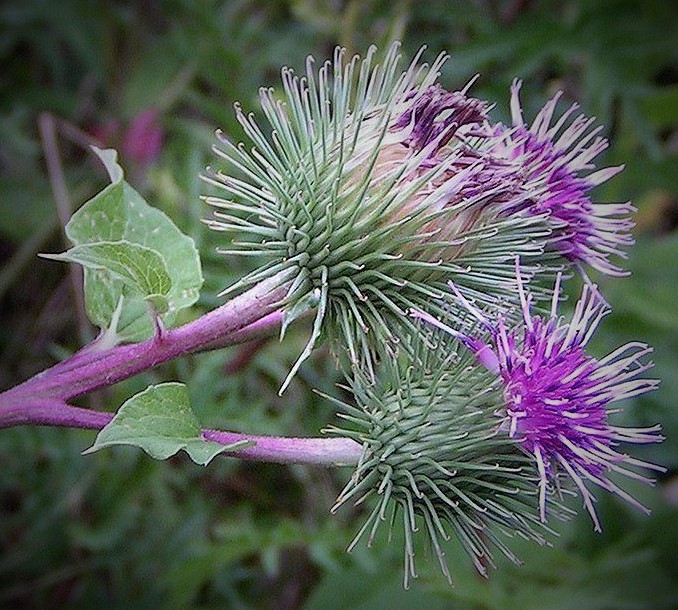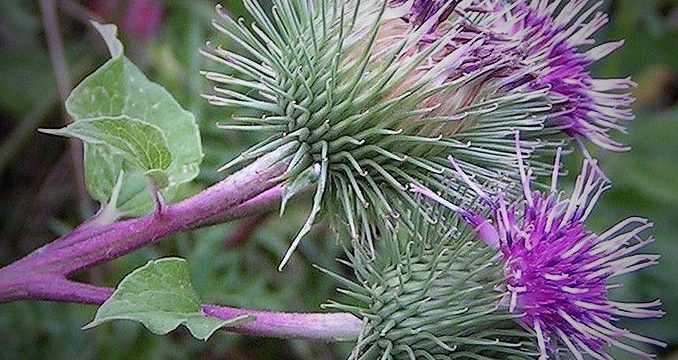Inflammation is a critical feature of cancer, which not only drives the oncogenic transformation of epithelial cells, but promotes growth, progression, and metastasis.
The natural compound, Arctium lappa (Burdock) Alhe, has anti-inflammatory effects in cancer cells such as melanoma, prostate, liver, hormone positive breast cancer, Triple negative breast cancer, pancreatic, leukemia and renal cells.
An interesting study entitled; Arctium lappa Extract Suppresses Inflammation and Inhibits Melanoma Progression Nascimento et al 2019 Medicines 29;6(3):81 1 investigated the effects of Alhe injection on different models of inflammation, in vivo. They found a reduction of neutrophil infiltration and production of inflammatory mediators after tumoral cell injection in mice treated with Alhe. They also found the Alhe injection had a striking impact on melanoma progression and mice mortality.”
The authors write:
“Arctium lappa L. (popularly known as burdock) is widely used in popular medicine worldwide as a diuretic and antipyretic agent and has also been used to treat hypertension, gout, hepatitis, and other inflammatory disorders [17,18]. Interest in A. lappa extracts has grown due to their ample therapeutic potential [19–21]. A. lappa extracts contain several compounds, including flavonoids, lignans, tannins, phenolic acids, alkaloids, and terpenoids [20]. Interestingly, lignans from A. lappa exhibit antiproliferative and apoptotic effects over leukemic cells [22], and also have anti-tumoral effects on pancreatic cancer cell lines [23]. Moreover, the main active compound of A. lappa L., Arctigenin, have shown to exhibit anti-inflammatory effect in a mouse model of colitis, operating via the inhibition of MAPK and NF-κB pathways [24].”
“A. lappa extract has been shown to reduce cell viability, causing apoptosis and also reducing proliferation of the breast cancer cell lines MCF7 and MDA-MB-231 [39]. Another study found anti-proliferative activity of A. lappa extract against additional cell lines, such as K562 (leukemia) and 786-0 (renal cancer) [40]. In addition, A. lappa root extract exhibits protective properties against toxic substances, lowering cell mutations. Most studies related to A. lappa anti-tumoral activity were Medicines 2019, 6, 81 8 of 10 performed with Arctigenin and Arctiin, lignans that influences intracellular pathways targeted for anti-tumoral therapies. Arctigenin is able to eliminate nutrient-deprived cancer cells [22], to inhibit liver cancer tumorigenesis [41], and to repress melanin synthesis in B16BL6 melanoma cells [42]. Arctiin inhibits growth of the human prostate cancer… [43].”
Burdock is a perennial plant native to Europe and Northern Asia. The root has been consumed as food in Asia for many centuries. In addition to anticancer properties, preclinical data indicate burdock has antibacterial, anti-inflammatory, antiulcerogenic, hepatoprotective and antidiabetic properties.
SAFETY NOTES: Do not take Arctium lappa, if you are allergic to chrysanthemums as it may exhibit cross-sensitivity to burdock or if you are pregnant as it may cause uterine stimulation.
1. Nascimento BAC, Gardinassi LG, Silveira IMG, et al. Arctium lappa Extract Suppresses Inflammation and Inhibits Melanoma Progression. Medicines (Basel). 2019;6(3).
To learn HOW TO FIND AND CREATE YOUR OWN PERSONALISED TREATMENT ARRAY OF NATURAL COMPOUNDS KNOWN TO KILL CANCER CELLS OF YOUR TYPE you can enroll in my new online course.
CLICK HERE to go to my STARTER COURSE – FIND YOUR NATURAL COMPOUNDS

